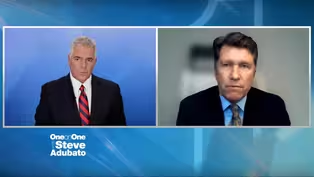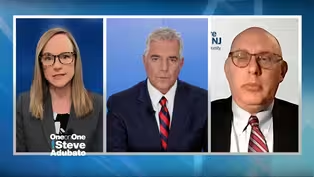One-on-One
Opportunities and Challenges Facing the Non-Profit Sector
Clip: Season 2024 Episode 2723 | 8m 14sVideo has Closed Captions
Opportunities and Challenges Facing the Non-Profit Sector
Steve Adubato talks with Linda Czipo, President & CEO of NJ Center for Nonprofits, about the opportunities and challenges facing non-profit organizations, and how a hybrid workforce has impacted the ability to hire, train, and retain a talented workforce.
Problems playing video? | Closed Captioning Feedback
Problems playing video? | Closed Captioning Feedback
One-on-One is a local public television program presented by NJ PBS
One-on-One
Opportunities and Challenges Facing the Non-Profit Sector
Clip: Season 2024 Episode 2723 | 8m 14sVideo has Closed Captions
Steve Adubato talks with Linda Czipo, President & CEO of NJ Center for Nonprofits, about the opportunities and challenges facing non-profit organizations, and how a hybrid workforce has impacted the ability to hire, train, and retain a talented workforce.
Problems playing video? | Closed Captioning Feedback
How to Watch One-on-One
One-on-One is available to stream on pbs.org and the free PBS App, available on iPhone, Apple TV, Android TV, Android smartphones, Amazon Fire TV, Amazon Fire Tablet, Roku, Samsung Smart TV, and Vizio.
Providing Support for PBS.org
Learn Moreabout PBS online sponsorship(upbeat music) - Hi everyone, Steve Adubato.
We kick off the program with With Linda Czipo, who is the President, and CEO, New Jersey Center for Nonprofits, we'll put their website up.
Linda, great to have you with us again.
- Thank you.
Nice to be here.
- Linda, what would you say the top two, three challenges are for not-for-profits in 2024.
- One is not new, and that is that there is a big disconnect between the rising demand for the services that nonprofits are providing in our communities and the funding and the resources needed that are not keeping pace.
That has been the case for quite some time, it was exacerbated by the pandemic and other factors.
So that's certainly challenge number one.
Another one is the workforce shortage.
Nonprofits are experiencing, this is nationwide, but certainly very acute in New Jersey, a severe shortage of vacancy, high vacancy rates and trouble filling those vacancies.
And that's also due to a number of different factors.
To what degree do you find that not-for-profits, and I think about this a lot because as a not-for-profit, we partner with a lot of other not-for-profits.
We're partners with public broadcasting, we partner and together we can do more than we can do alone.
Question here, as all of us as nonprofits leaders, work, no money, no mission, you know what I'm talking about, to raise money, half of my time, 60% is involved in raising money.
Here's the question, how the heck are we supposed to collaborate and partner with other nonprofits who we often compete with for grants from corporations and foundations?
But we know we can't do it alone.
Help us understand that difficult balancing act.
- I guess the first thing I would say is that there is, I think, a little bit of a misperception that nonprofits don't collaborate or don't collaborate as much as they do because, certainly from where I sit, I see a lot of really good and impactful partnerships that go on all the time.
I think one of the challenges and the opportunities is, we have to get past this scarcity mindset.
The always idea that we have to do more with less, that that has to be the MO for every single nonprofit, and it's not sustainable.
And that's part of the reason why we're in this situation where it looks, it's pretty stark right now for the nonprofit community.
- Go ahead, describe that.
- Well again, get back to the idea of demand for nonprofit services keeps going up.
- Yeah.
- The resources needed aren't keeping pace, and we've nurtured for too long, this misperception that if a nonprofit invests in itself, if it pays its people adequately so that you're not constantly having to recruit for people who then have to leave.
If you're investing in technology and research and development, all the kinds of things that nobody blinks when the for-profit community does these things, it's good practice.
We somehow have gotten into this mindset where we question it when it comes to the nonprofit community.
And it's taken quite a bit of time to get into those assumptions, but it's also gonna take a lot of time to get out of them.
But we have to do it.
- We do have to do it, and actually, we are constantly Beyond competitive salaries, what else do you think most professionals in a not-for-profit community are looking for?
- I think one thing that that nonprofit community has going for it, of course, is the values and the mission-based nature of what we do.
And that's something that is very attractive to emerging professionals.
We have to live those values every day.
And that means investing in our people and making sure that we are practicing, emulating good practice in terms of work-life balance, making sure that we are not burning our people out.
That when it comes time to, the sad truth is, for too many organizations, when the budget isn't there, you've got wonderful, talented, enthusiastic people who come into the field, but they can't afford to stay if you can't afford to pay them fairly.
So it's compensation, it's benefits, it's living your values, it's making sure that you have infused in top to bottom and left and right, throughout the organization, a culture of belonging and making sure that you are not only recruiting great people, but you're also training them well and onboarding them well and respecting their wisdom and making sure that there are opportunities for growth.
And that's certainly not unique to nonprofits, but we need to live those values every day.
- How about this?
When we're doing this remotely, not all of our productions are remote, but the vast majority of them are.
And you and I were having this conversation right before you got on the air, when we were in studio and you are based where you are, it was about a three hour back and forth plus in the studio waiting and all that, and we're doing this remotely.
It is better to do interviews in-person, let's not kid ourselves.
But it's more efficient to do it this way.
Question as it relates to nonprofits, what have you seen in the not-for-profit community in terms of in-person, remote, hybrid, and people adapting to that?
- It is a mix for sure.
I mean, one of the things that happened, of course, during the pandemic is, this technology was available.
I mean, prior crises, 10, 20 years ago, that certainly wasn't even an option.
So the fact that you could pivot, to use that word, to zoom or other kinds of things was really, really helpful because in a number of industries, that would allow the work to continue.
Board attendance, if you've got a board that's situated throughout the state - They're all over the place.
- Participation is gonna be a lot higher.
- All over the country.
- Absolutely, absolutely.
So those things were really, really helpful.
Now, the downside, of course is, for a lot of nonprofits, of course, they had to cancel their events or change things from in-person to Zoom.
That's not always the same as being in-person.
And then back to the employment situation, first of all, we all know that not every nonprofit can do their work remotely.
Even if some employees can be remote in a lot of different nonprofit fields, they can't all be remote.
So that's one thing.
- Yeah.
- I mean, it does provide opportunities in terms of recruiting and some employees, or some would-be employees who don't want to come into the office all the time, again, it's got a labor shortage, so we have to adapt.
But it does create challenges in terms of making sure that people stay connected and making sure that everybody is kind of rowing in the same direction.
I can't thank you enough for joining us, Linda, thanks so much.
- Thanks so much, appreciate it.
- Stay with us.
We'll be right back.
- [Narrator] One-On-One with Steve Adubato is a production of the Caucus Educational Corporation.
Celebrating 30 years in public broadcasting.
Funding has been provided by Horizon Blue Cross Blue Shield of New Jersey.
NJM Insurance Group.
Robert Wood Johnson Foundation.
The Russell Berrie Foundation.
Valley Bank.
Veolia, New Jersey Sharing Network.
The North Ward Center.
And by And by Kean University.
Promotional support provided by The New Jersey Business & Industry Association.
And by Northjersey.com and Local IQ.
NJM Insurance Group has been serving New Jersey businesses for over a century.
As part of the Garden State, we help companies keep their vehicles on the road, employees on the job and projects on track, working to protect employees from illness and injury, to keep goods and services moving across the state.
We're proud to be part of New Jersey.
NJM, we've got New Jersey covered.
CEO & Publisher of ROI-NJ Talks Leadership & Innovation
Video has Closed Captions
Clip: S2024 Ep2723 | 10m | CEO & Publisher of ROI-NJ Talks Leadership & Innovation (10m)
Mental Health Concerns in our Political Environment
Video has Closed Captions
Clip: S2024 Ep2723 | 10m 12s | Mental Health Concerns in our Political Environment (10m 12s)
Providing Support for PBS.org
Learn Moreabout PBS online sponsorship
- News and Public Affairs

Top journalists deliver compelling original analysis of the hour's headlines.

- News and Public Affairs

FRONTLINE is investigative journalism that questions, explains and changes our world.












Support for PBS provided by:
One-on-One is a local public television program presented by NJ PBS

